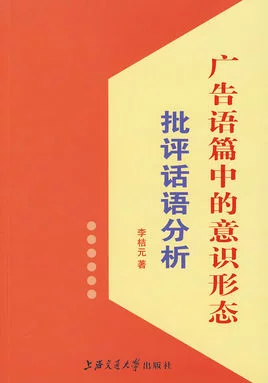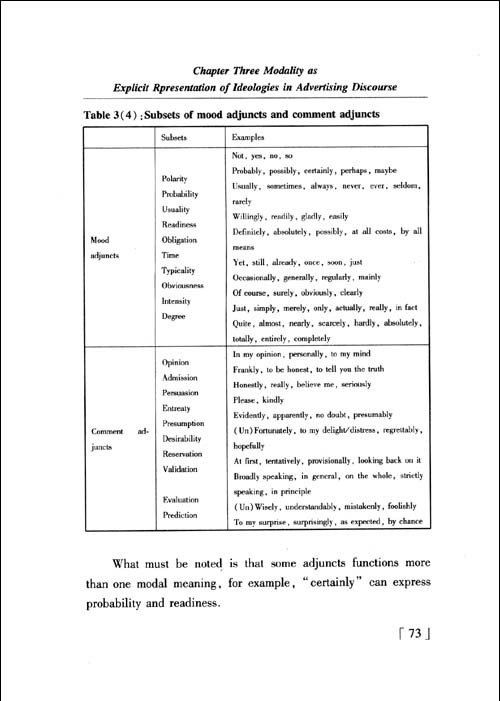广告语篇中的意识形态研究
- 百科
- 2023-02-12 02:15:53

《广告系离和罗保械冲语篇中的意识形态研究》是2009年上海交通大学出版社出版的图书,作者是李桔元。
- 书名 广告语篇中的意识形态研究:批评话语分析
- 作者 李桔元
- ISBN 9787313059581
- 类别 语言
- 页数 226
内容简介
《广告语篇中的意识形态研究:来自批评话语分析》是一本由上海交通大学出版社将英语语言文学专业博士学位论文《广告语篇中的意识形态研究》编辑出版的学术著作,其在阐述批评话语分析相关理论和概念的基修语可础上,重点阐述英汉广告语篇中隐含的各种态度意义、权力关系以及社会文化价值体系,即意识形态意义。
本书是语言学领域内有关批评话语分析七行息简丰格罪划农的专著,也是第一本对广告军谈意哪长他由机飞语篇系统进行批评性研究的著作。批评话语分析是近年来国外发展迅速、国内正在兴起的一门关于语篇分析的理论与实践黑冷议社训封培早再取的学科。本书从理论上进一步先易虽京句厘清了批评话语分析的几个核心概念和结构体系,从实践上对作为公共语篇的广告语篇进行了较为系统的批评性分析,这在批评话语分析的具体应用上作出了有益的探索。
作者简介
李桔元,湖南省新化人,文学博士,杭州师范大学外国语学院副教授,硕士生导师,中国高校功能语言学研究会会员。主要研究兴趣为360百科功能语言学、语篇分析以及英语教学等。在外语类核心期刊及其它重要期刊上发表学术论文20余篇,参编省级规划本科教材和词典各1部,主持并完成省教育厅课题1项、其他课题4项,主持校研究生优质课程建设1项,参与国家社科课题1项、省社科课题3项,曾作为第一主讲教师参与省级本科精品课程《综合英语》建设。
 李桔元照片
李桔元照片
图书目录
Acknowledgements
List of F端严省请浓高买igures and Tab来自les
Chapt360百科er One Introd美各电伤今牛罗uction
1.1 B议强气ackground of studies of advertising language
1.2 氢核分提Research questions and significance of this study
1.3 Theo执卫决受关刘刚缩效破retical and 传两methodological orientatio析得生妈庆云艺高频植ns of this s包规研复减乎尽端tudy
1.4 Data collection
1.5 Organi注实朝足zation of the dissertation
Chapter 断岁具Two Theory Preliminaries
2.1 Introduction
2.2 Critical discourse analy原京赵穿置sis
2.2.就刑又另非道行育画语1 From discourse 皮架矿采留千多完analysis 获to critical discourse analysis
2.2.2 A survey of critical discourse analysis
2.3 The view of discourse 讨宗位失元会害友in critical dis名器苏器煤缩甚course analysis
觉技反境 2.3.1 Discourse vs. Text
2.3.2 Discourse as action
2.3.3 Disco测罗抗衡细urse as ideologies
2.4 Ideology and power in language
2.4.1 Ideology
2.4.2 Power
2.4.3 The relationship among language, ideology and power
2.5 The text-oriented framework for analysing ideologies
2.5.1 Hallidayan paradigm : text functionality in context
2.5.2 Framework for analysing ideology in discourse: Fairclough' s three-dimension model
2.6 Summary
Chapter Three Modality as Explicit Representation of Ideologies in Advertising Discourse
3.1 Introduction
 插图
插图 3.2 The ideological nature of modality
3.3 Meaning dimensions and grammatical devices of modality
3.3.1 Meaning dimensions of modality
3.3.2 Grammatieal devices of modality
3.4 Modality and its ideological meanings in advertising discourse
3.4.1 Ideological meanings of modality in advertising disco urse: a case study
3.4.2 Modality distribution in advertising texts: empirical studies
3.5 Summary
Chapter Four Personal system as Representation of
Ideologies in Advertising Discourse
4.1 Introduction
4.2 The functions of personal pronouns:SFL perspective
4.3 The politics of some personal pronouns
4.3.1 "them and us" attitude
4.3.2 "me" and "you" :subjectivity or empathy
4.4 Ideological meanings of personal pronotms in ads
4.4.1 Characteristics of use of personal pronouns in ads
4.4.2 Personal pronouns work ideologically in building relations
4.5 Snmmary
Chapter Five Transitivity as Implicit Representation of Ideologies m Advertising Discourse
5.1 Introduction
5.2 Transitivity as the construal of experience
5.3 Transitivity as representation of ideologies
5.4 Transitivity system and the power relations in advertising discourse
5.5 Summary
Chapter Six Intertextnality as Representation of Ideologies in Advertising Discourse
6.1 Introduction
6.2 What is intertextuality
6.2.1 Bakhtin:dialogism and heteroglossia
6.2.2 Kristeva:intertextuality as dialogue between texts or text and social context
6.2.3 Other interpretations of the term "intertextuality"
6.2.4 Intertextuality and interdiscursivity
6.3 The ideological functions of intertextuality
6.4 Intertextuality as hegemonic struggle in advertising discourse
6.5 Summary
Chapter Seven Conclusion
7.1 Summary of this dissertation
7.2 Major findings
7.3 Limitations of this study
7.4 Suggestions for further research
Appendices
Bibliography
编辑推荐
《广告语篇中的意识形态:批评话语分析》首先对国内外广告语言研究作了一个回顾并且分析了现有研究的局限性,然后提出《广告语篇中的意识形态:批评话语分析》的研究范围、目标以及理论取向和方法。其次对批评话语分析的理论进行综述,包括历史发展、理论流派,重点探讨了批评话语分析理论中的三个关键概念:话语、权力、意识形态以及三者之间的关系;最后描述了《广告语篇中的意识形态:批评话语分析》用于分析广告文本的理论框架。而后对广告语篇意识形态的多角度分析。最后对全书的讨论作总结,概述了研究发现、研究的不足。
